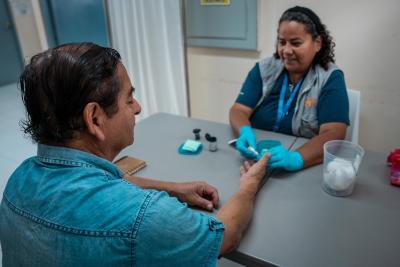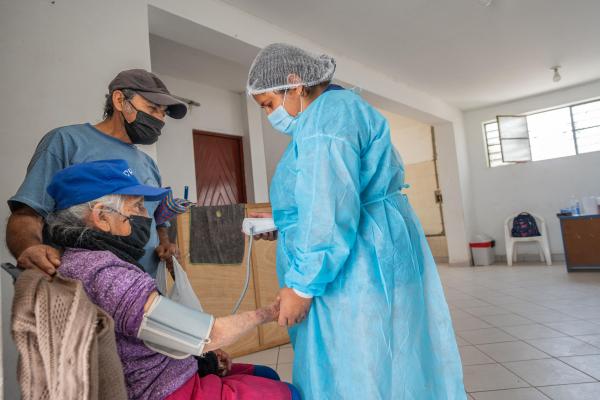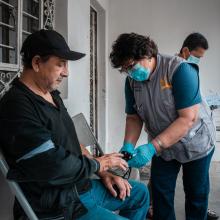A diagnosis of diabetes can trigger anxiety and stress, intensifying the risk of depression. On World Day to Combat Depression, it is crucial to recognize how this disease affects mental health by increasing the fear of serious complications and impairing the patient’s quality of life.
Recent studies, such as those in Lancet Psychiatry (2021), Diabet Medicine (2022) and the Journal of Psychosomatic Research (2021), show that diabetes doubles the risk of depression, increases vulnerability to anxiety and aggravates stress, affecting glucose control and metabolic health.
“There is evidence of a high prevalence of depression in people diagnosed with diabetes,” adds psychologist María Fernanda Amézquita, from the Mental Health Program (SAME) of Socios En Salud. And the fact is that those with diabetes face a constant worry about developing serious complications, from cardiovascular disease to kidney damage.

Inyecciones, monitoreo de glucosa y dietas estrictas imponen una carga emocional diaria en las personas que viven con diabetes.
Foto de SES
This fear affects quality of life, altering mood and increasing the daily emotional burden. A scenario compounded by mental exhaustion, another frequent challenge. “Going through medical controls, such as insulin injections or monitoring sugar levels, can generate a feeling of mental fatigue,” the specialist points out.
In addition, many people with diabetes face stigmatization, especially in cases of type 2 diabetes. The negative perception associated with their condition can lower their self-esteem and generate feelings of shame or guilt, further deepening emotional problems.
In Socios En Salud, screening in the TAMI initiative showed that 29% of patients evaluated had mild depressive symptoms, while 9% had moderate depression. In addition, 11% showed suicidal ideation, alarming data that evidence the importance of a comprehensive approach.
Factors that aggravate emotional problems
The management of diabetes involves constant challenges that can impact patients’ emotional health. According to María Fernanda Amézquita, the main factors that aggravate this situation include:
- Diabetes management-related stress: daily demands, such as monitoring glucose and following treatments, generate an emotional burden that can be overwhelming.
- Episodes of hypoglycemia or hyperglycemia: variations in sugar levels affect mood, ability to concentrate and general well-being, increasing anxiety.
- Chronic complications: conditions such as neuropathy, vision loss or kidney damage increase fear and worry, compounding emotional stress.
- Stigma and negative self-perception: feelings of shame or guilt for not adequately managing the disease can weaken self-esteem and make it more difficult to cope with treatment.
- Lifestyle changes: adopting new habits, such as modifying diet or incorporating exercise, can be complicated, especially if these changes are not pleasant or habitual.
- Lack of a support network: the absence of family or friends to provide companionship and emotional support can lead to greater isolation and high levels of stress.

La psicoeducación, la terapia breve y la derivación a servicios especializados marcan la diferencia en la lucha contra la depresión para personas con enfermedades no transmisibles.
Foto de SES
Strategies for comprehensive wellness
The Partners In Health SAME Program has implemented effective strategies to address the emotional challenges of people with diabetes. These actions seek to improve quality of life through a comprehensive approach that combines psychoeducation, therapy and referral to specialized services.
Psychoeducation is a key tool. Providing clear and accessible information helps patients better understand their condition and provides them with strategies to manage stress and anxiety, strengthening their ability to cope with the disease.
For those with mild symptoms of depression, the “Coping with Problems Plus” intervention offers psychological support based on cognitive behavioral therapy. This program, developed by the World Health Organization (WHO), consists of six sessions that teach practical skills to improve emotional health and reduce everyday problems.
Patients with moderate or severe depression, as well as those with suicidal ideation, are referred by Socios En Salud to specialized public institutions. This process includes accompaniment by a community health agent or SAME professional to ensure they receive the necessary care.
Each of these strategies also aim to strengthen adherence to treatment for people living with diabetes. “This can help patients feel like they are taking control of their health, reducing anxiety, stress and fear of serious complications,” Amézquita says.

El acompañamiento y la educación comunitaria son claves para combatir el estigma asociado a la diabetes y la salud mental.
Foto de SES
Community accompaniment and education
Community accompaniment plays a central role in the Partners In Health approach. This model promotes support networks within the community, facilitating the integration of local resources and reinforcing patients’ emotional well-being.
In addition, community education helps reduce the stigma associated with diabetes and mental health. By raising awareness of these issues, it fosters a more inclusive and empathetic environment, where patients feel understood and supported.
Family support is critical. Involving loved ones in the care process not only strengthens relationships, but also improves adherence to treatment, generating a positive impact on the patient’s emotional and physical health.
On World Anti-Depression Day, recognizing the interrelationship between diabetes and mental health is key. The strategies implemented by Socios En Salud highlight the importance of a holistic approach that addresses both physical and emotional challenges, promoting complete wellness.
If you would like to receive more information on our activities, subscribe here. Join our health movement!
.



